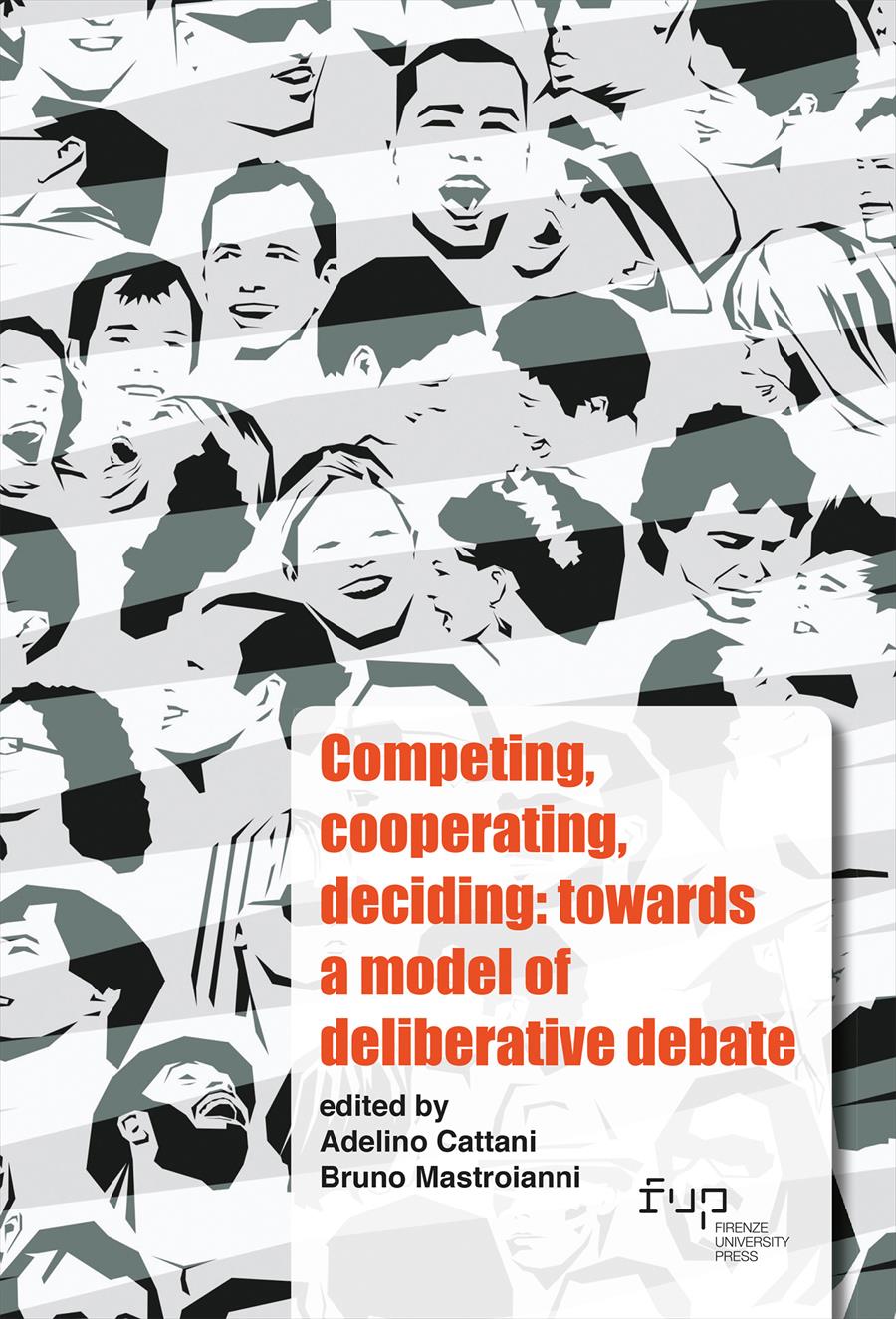- Competing, cooperating, deciding: towards a model of deliberative debate
- Edited by Adelino Cattani, Bruno Mastroianni
Filosofia e dibattito. Le Meditazioni Cartesiane come esempio di deliberazione filosofica
- Caterina Gabrielli
- © 2021 Author(s) |
- CC BY 4.0
- DOI: 10.36253/978-88-5518-329-1.13
This essay relates the content of an educational experience that applies the methodology of debate to the closer examination of an argumentative philosophical text, in the form of a deliberation with oneself. The text in question is Descartes’ Meditations on First Philosophy, specifically the first, the second, the sixth meditation and respective Objections. The class involved in the activity is the IV B of the Liceo classico Alessandro Manzoni in Lecco.
- Keywords:
- Debate,
- Education,
- Cartesian Meditation,
- Aristotele. 1994. Opere. Roma-Bari: Laterza.
- Bergson, H. 1967 (1925). La teoria dell’istituzione e della fondazione. Torino: Giuffré.
- Bergson, H. 2004 (1922). Durata e simultaneità. Roma: Raffaello Cortina.
- Berti, E. 2001. Aristotelismo. Bologna: Il Mulino.
- Biscuso, M. 2015. “Descartes e la trasformazione della meditatio in genere letterario.” Lo Sguardo 17 (1): 59-88.
- Canziani, G. 1990. “Some Aspects of Eloquence in Descartes’s Works.” Argumentation 4: 53-68.
- Cartesio. 1967. Meditazioni metafisiche. Risposte alle Quinte Obiezioni. In Cartesio. Opere. Roma-Bari: Laterza.
- Cattani, A. 1994. Forme dell’argomentare. Padova: Edizioni GB.
- Danto, A. C. 1984. “Philosophy as/and/of Literature.” Proceedings and Addresses of the American Philosophical Association LVIII, 1: 5-20.
- van Eemeren F., e R. Grootendorst. 2008. Una teoria sistematica dell’argomentazione. Milano: Mimesis.
- Gilson, E. 1930. Etudes sur le rôle de la pensée médiévale dans la formation du système cartésien. Paris: Vrin.
- Gouhier, H. 1955. “La résistance au vrai et le problème cartesien d’une philosophie sans rhétorique.” In Retorica e barocco. Atti del III Congresso Internazionale di Studi Umanistici, Venezia 15-18 giugno 1954, a cura di Enrico Cattanei, 85-98. Roma: Bocc
- Hadot, P. 2008. La filosofia come modo di vivere. Conversazioni con J. Carlier e Arnold I. Davidson. Torino: Einaudi (La Philosophie comme manière de vivre. Paris: Albin Michel, 2001).
- Mayer, M. 2009. La problematologia, filosofia, scienza e linguaggio. Ariccia (RM): Aracne editrice.
- Perelman, C., e L. Olbrechts-Tyteca. 1976. Trattato dell’argomentazione. La Nuova Retorica. Torino: Einaudi.
- Rorty, A. O. 1983. “Experiments in Philosophic Genre: Descartes’ Meditations.” Critical Inquiry 9: 545-64.
- Rée, J. 1984. “Descartes’s Comedy.” Philosophy and Literature 8: 151-66.
- Trabattoni, F. 1997. “Platone e la comunicazione.” In Associazione italiana di cultura classica, Delegazione della Brianza, vol. VII (8), a cura di K. Syggelasai, 7-25.
Chapter Information
Chapter Title
Filosofia e dibattito. Le Meditazioni Cartesiane come esempio di deliberazione filosofica
Authors
Caterina Gabrielli
Language
Italian
DOI
10.36253/978-88-5518-329-1.13
Peer Reviewed
Publication Year
2021
Copyright Information
© 2021 Author(s)
Content License
Metadata License
Bibliographic Information
Book Title
Competing, cooperating, deciding: towards a model of deliberative debate
Editors
Adelino Cattani, Bruno Mastroianni
Peer Reviewed
Number of Pages
168
Publication Year
2021
Copyright Information
© 2021 Author(s)
Content License
Metadata License
Publisher Name
Firenze University Press
DOI
10.36253/978-88-5518-329-1
ISBN Print
978-88-5518-328-4
eISBN (pdf)
978-88-5518-329-1
Series Title
Communication and Philosophical Cultures. Researches and Instruments
Series ISSN
2975-1152
Series E-ISSN
2975-1233
